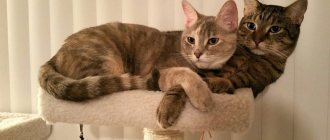2297Administration
10
Does your cat just sit and stare at you when you throw her a ball? You may be concerned about this. Let's look at why your cat may be apathetic to play and what you can do about it.
All kittens play, but their high interest in play peaks around 4 to 5 months of age and then gradually declines.
Once cats reach adulthood, they tend to fall into two groups: those that continue to play and those that prefer to be less active.
© shutterstock
Inactive behavior may be normal, but you also need to rule out health problems that may be affecting your cat's behavior.
Why doesn't the cat play anymore?
Cats are very playful animals, so it's strange to see them stop playing. There are a number of reasons why a cat may stop playing, including:
- Boring or old toys
- Stress
- Depression
- Injury
- Health problems
We will now look at each of these points and their solutions in detail. To make your cat feel happy and playful again as soon as possible!
© shutterstock
How to calm an aggressive cat
The first thing you need to do is let your pet take his place or set aside a dark corner to rest. Minimize triggers and avoid contact with the cat for as long as necessary to calm the animal. What to do if the cat is aggressive and attacks? Get a towel or blanket to wrap her in to block the threat. You can take a water pistol and use it for protection. Usually it is enough to spray the cat once to bring him to his senses.
After this, try not to irritate the furry creature. Walk slowly and smoothly, talk more quietly. Your pet is also a person whose feelings must be taken into account. If you have a different opinion, then it’s better not to get cats at all, much less dogs. Remember that you must demonstrate goodwill. No physical punishment, immersion in icy water or other extreme measures. This will only make the situation worse.
Boring or old toys
The first reason why your cat suddenly stopped playing is simply because she is not interested in her toys. They may have had these toys for a long time, or no one will play with them. However, this is a common cause and very easy to find.
Cats are quite easy to entertain due to their inquisitive and playful nature. Many people are fascinated by a simple cardboard box. So, if you notice that your cat isn't playing with her toys anymore, it might be time to buy her some new, cool toys that will pique her interest.
You can go to your local pet store for new toys, artificial mouse, ball, feathers, etc. Or make your own at home.
How to understand that a male is ready for mating
If you don't know when your furry friend has reached puberty and is ready to mate, look at his behavior:
- If previously the animal constantly showed affection, but the pet’s behavior changed dramatically: the male became more aggressive.
- Puberty occurs exclusively after the first year of life.
- Using soft toys or the owner's slippers to satisfy sexual needs.
- The pet began to mark the territory (upholstered furniture, shoes of the animal owner, doors).
- The pet may purr constantly, then meow loudly.
These changes in behavior are typical during puberty of a furry friend. Using the above actions, your pet asks for an individual of the opposite sex.
shutterstock
Stress
There are many reasons why a cat may be stressed, from moving to a new place to loud noises or even the arrival of a new pet in the house. However, we need to know what to do when our cat is stressed. It is very important for them to feel comfortable and at ease in their own home. In this way we help them live a happy and healthy life.
The solution to this problem would be to first help them relax and not feel stressed. Then they will want to play again. Spending quality time with them and playing with them will also help them feel less stressed, accompanied and loved.
How to tame a wild kitten
First you need to determine how scared or aggressive the kitten is:
- The most difficult cases are considered to be when an animal hisses at a person or even tries to attack him - such feral cats probably did not receive affection from people for a long time or were born on the street;
- If a kitten meows and does not run away at the sight of a person, then it was probably recently kicked out into the street.
In the first case, you need to be more careful, since the kitten can respond to any wrong action with aggression and run away.
Try to pick up the kitten carefully, without grabbing its paws or tail. Carrying is also acceptable
The new resident should be allowed to get comfortable in the house on their own. This will help him feel more comfortable. Gradually, the kitten needs to be shown where the food and toilet are. Don't yell at the cat, and especially don't hit him. If the pet sees that it is not in danger, then, having satisfied its hunger, it will look for a place to sleep. After this, you can proceed directly to taming your pet.
You shouldn’t expect a wild cat to get used to the house in a couple of hours; give it a few days and don’t disturb it with unnerving procedures.
When the kitten remembers where his food is and stops hiding from you, try giving him a treat from your hand
If he accepts it, you can try to gently stroke his head and back. Next, there are two options for the development of events:
- if the kitten runs away from you, then you need to leave it alone, but repeat the steps of feeding it with treats three times a day or more often;
- If the kitten reacts normally to stroking, making it clear that it likes it, you should try placing it on your lap.
It is better to sit on the floor. This way you won’t have to lift your pet too high, and he won’t be frightened by a sudden change in position. If after this the kitten immediately wants to jump to the floor, do not stop it or hold it by force. It is better to repeat the steps after some time. This will let your animal know that he can feel comfortable with you.
Is it possible to tame an adult cat?
Adult animals can also be tamed and taught to accept affection, but this is more difficult to do. This is due to the fact that they have already formed their character and developed certain habits. In addition, wild animals may remember being hurt by other people.
Otherwise, the methods for taming adult animals are similar to those used for kittens. A calm atmosphere, delicious food, gentle touches and the absence of stressful situations will help turn a wild furry into an affectionate and grateful friend.
Before accustoming your cat to handling, feed him well. A sleepy animal that does not feel hungry will become more docile and will be more willing to be handled. But at the same time, you should not overdo it with food; do not feed your pet just to hold it on your lap.
It is believed that adult cats, unlike kittens, pay attention to the owner’s voice and intonation. Talk to your cat while you feed him, and continue to talk while you pet him, scratch behind the ears, etc.
p. After some time, the cat will develop an associative connection, and he will perceive your voice as a signal for something pleasant. Listening to him, the cat will sit in your arms without experiencing the same discomfort.
In extreme cases, you can purchase cat sprays with pheromones at pet stores, but you should not abuse them.
If your pet has a playful nature, then you can try to lure him onto your lap using his favorite mouse or bow. Let the cat jump on your legs and catch the “prey”, and then release the toy. This way, your pet will unconsciously get used to the fact that it is safe to be on your lap.
Be prepared for the fact that during such games the cat may scratch you; do not scold him for this so as not to scare him away.
Depression
Depression in cats is another possible reason why your cat suddenly stopped playing. Similar to stress, depression in cats can be caused by many things, such as a new pet in their home, punishment, loss of a primary caregiver, etc.
To deal with depression, you need to be patient and caring because they need you now more than ever. Communication, affection, company and play with them will help them feel less lonely and depressed.
Once your cat begins to recover from the stressful situation that caused her depression, she will become her usual curious, loving, and playful cat.
How to accustom a cat to your hands
It is better to teach a cat to sit on your arms from an early age. Adults have an already established character and it is extremely difficult to retrain them.
Accustoming should be gradual and not cause a negative reaction in the cat. If she breaks free and runs away, do not interfere with her and do not insist on your own, so as not to cause even greater rejection. If you hold a cat by force, it will become afraid of people, hide, bite and scratch as soon as you reach out to it.
If you get a pet that is not at all tame, start from afar: as you pass by, stroke the cat with your fingertips. When she gets used to this and won’t run away when she sees you, you can start stroking her fur with your hand.
Feeding from the palm of your hand and rewarding him with some kind of treat after ironing will help the animal get used to your hands. You can put catnip on your palms to associate your hands with something pleasant.
When the cat allows itself to be stroked without fear, you can try to pick it up, sit it on your lap and stroke it. Perhaps at first she will run away. Don't try to hold her back. Patience and affection on your part will help your cat feel safe and relaxed. After some time, she will happily jump into your arms, cuddle and purr.
In any case, if your cat does not yet share your desire to hold her in your arms, do not be upset, this does not mean that she does not love you. She's just a cat.
Injury
When adopting a cat from a shelter, sometimes these cats become scared, stressed, sad, or traumatized because their previous caregivers failed them. If you've adopted a young or adult cat from a shelter and are wondering why they aren't playing yet, this may be the reason.
© shutterstock
When dealing with traumatized cats, it is also very important to be patient, gentle and loving with them as we don't know what may be causing their trauma. Over time, they will learn to trust us and understand that they are now safe. During this period, we must be patient, give them our space, but also affection.
Trying to play with them is also important, but keep in mind that some cats with unhealthy upbringings may not be able to play. However, with time and patience, we can help them recover and live their best life.
What to do if the kitten is lethargic and constantly sleeps?
If your kitten is lethargic and sleeps constantly, there is no need to panic.
A healthy pet sleeps almost the whole day during the first month of life, waking up to eat and play a little. Adult cats are already awake 7-9 hours a day. They spend time playing, hunting and communicating with their owners. A cat may sleep constantly not only because of pain or loss of strength. Factors that influence sleep duration :
- heat, low atmospheric pressure;
- home comfort and calm atmosphere;
- high activity while awake;
- dense feeding of the pet;
- Age: Old cats and young kittens can sleep up to 20 hours a day.
If the kitten is active and eats well when it wakes up, there is no need to worry. Prolonged sleep is physiologically normal, since protein nutrition of animals requires long-term digestion.
Health problems
Finally, your cat may have suddenly stopped playing due to health issues. Of course, it is best to take your cat to the vet for an examination, as this may be a clinical sign of an underlying disease or other health problem. Some of the most common reasons why a cat has stopped playing include:
- Obesity : Overweight cats may have difficulty moving around and playing. They may lie down and sleep more than usual because their physical activity causes physical pain. The best thing to do in this case is to talk to your veterinarian about the right diet for your cat and how to get her more active to help her lose weight and get healthy again.
- Arthritis : This, along with other age-related health problems, can limit a cat's ability to move. If you notice symptoms of arthritis in your cat, you will need to take them to the vet for proper diagnosis and treatment.
- Anemia : Cats may feel tired because their bodies are not getting the nutrients they need to function properly. You will also need professional help as a veterinarian will need to properly examine your cat and find the right treatment for its condition.
- Visual impairment : As cats age, they may begin to lose their vision. This may make them less playful.
If you think your cat has stopped playing because of a health problem, it is best to take her to the vet as soon as possible. Your veterinarian can even help you figure out how to help a cat who is stressed, depressed, or injured.
Article author: Jungle Luque I am an ethologist, specializing in dogs and cats. I am also a dog trainer and a psychology student. I was lucky to grow up surrounded by a wide variety of animals.
Causes of lethargy
When an animal is sick, it becomes drowsy, aggressive, and lethargic. This condition is immediately noticeable in children, because when nothing bothers them, they love to jump and play.
There are several explanations why a kitten is lethargic.:
- disturbed sleep patterns, when the animal sleeps during the day and plays at night;
- sterilization;
- taking deworming tablets;
- tick bite;
- viral or infectious disease;
- taking antibiotics;
- heat;
- full stomach;
- poisoning;
- concussion.
Any medication, injections and operations can have side effects on the animal’s condition. Often the kitten is lethargic after deworming, which indicates an incorrect dosage or an advanced disease. If your cat feels unwell for more than two days, contact your veterinarian. Gastric lavage may be required.
In addition to the diseases listed, a kitten may be lethargic due to anemia, obesity, poisoning, metabolic disorders, or urolithiasis. A prolonged decrease in the cat's activity, loss of appetite, and avoidance of communication should alert you. You should not give your pet injections or pills yourself, as this may worsen his condition.
The place where the cat calved
For domestic cats, if they are waiting for a new addition, the owners, as a rule, prepare a cozy place. According to the person, the animal will be comfortable and happy there. But very often cats ignore the nests prepared by caring owners and choose the strangest and most inappropriate places for lambing. The signs are deciphered as follows:
- The cat is very sensitive to the negative energy reigning in the house. Be sure that your home is a standard of calm and harmony if an animal gives birth to kittens in the house. The aura here is positive and calm. There are no negative attacks on your home.
- There is no need to be angry if a cat gives birth to a small child on your bed or in a cradle. The sign explains this fact in such a way that the animal has unlimited trust in its owners. She once again confirms that kind, sympathetic people live in the house.
- A cat has kittens on the bed of a single man - a sign that he will have problems in his personal life.
- The birth occurred on your clothes - great success awaits you in your profession
- If a cat lambs on your property or entrance, the sign indicates good prospects for the future. This applies to health, financial well-being, and relationships within the family. The sign insists that you keep one kitten from this lambing - if there is a black one, then it is black. This way you will maintain well-being and prosperity in your home.
The little bundle will become a powerful talisman of good luck for your family. Often all these signs remain signs. Still, if a cat lives in the house, you are guaranteed success in all your endeavors. And if an animal comes to you, and even with a litter, rest assured that troubles and illnesses will bypass you.
Simple signs that you are not only a provider for a pet, but also a beloved owner
Any cat feels affection for its owner, but expresses it in its own way.
There are several people in the family, but the cat sleeps on your bed. The animal rubs its head against your face, legs or arms. This is not only a sign of affection, but also a unique way for the cat to mark you with its scent. Looking into your eyes, the pet slowly opens and closes its own. Experiment: look at your cat and blink your eyes slowly and pointedly. If she has good feelings towards you, she will blink back. For cats, this gesture is a sign of friendliness; she does not want to compete with you and does not hold a grudge. When you open the front door, your cat runs towards you as fast as he can.
Of course, he is most interested in the “goodies” that you could bring, but the very fact of the owner’s return pleases the pet. The cat tries to be closer to you, climbs into your arms, meows to attract attention, and follows you around the rooms. She purrs and falls belly up when you look at her, readily offering her ears and neck for you to scratch. The cat is ready to endure even troubles from you - bathing, taking medications, checking with a veterinarian
If your relationship with the animal is not affected by such incidents, his love is unconditional.
What is the cat doing?
Rats and mice, which are still sometimes exterminated by a cat, are something of a related service. The cat has a different purpose. Cats, they say, have a unique bioenergetic system. Seals can correct the biofields of the surrounding space, sometimes even completely restoring and stabilizing them! Cats really are a way to normalize blood pressure, relieve headaches, and also help with stress.
At the same time, the cat reflects the human condition. If everything is in order with the owner, then the cat will sleep a lot, wash itself, and eat well. She will hide behind the sofa and closet if a person feels bad! At the same time, the cat will always come to calm down someone who has been unfairly offended.
Relationships between cats and dogs
The proverb “like a cat and a dog”, which has long been known to all of us, does not always turn out to be true. Indeed, these animals do not get along well with each other, this can be especially clearly observed in the relationship between street cats and dogs. At home, you can keep a cat and a dog at the same time if you raise them correctly. True friendship between these animals is unlikely to happen (although there are exceptions), but living together is quite possible. It is desirable that each animal has a place where it can retire and relax.
Relationships between cats and dogs most often do not work out due to differences in personalities and temperaments, as well as in body language. Using the table, you can clearly assess how great the difference is in the behavior of these animals.
How to introduce animals and help them bond
Differences in body language between cats and dogs
| Sign language | Cats | Dogs |
| Image | ||
| Tail held high | Friendliness, calmness, confidence | Anxiety, vigilance |
| Tail wagging | Indignation, indignation | Delight, joy |
| Closed mouth | Normal condition | Tension |
| drooping ears | Wariness, dissatisfaction | Joy, humility |
| Body tilt to the side | The desire to appear more aggressive and stronger than the enemy | Indicator of victory in a conflict situation |
| Supine position | Indicator of trust in a person | Desire for affection from the owner |
| Back arch | Self-defense, gesture used during hunting | Playful mood |
Games are as important as food
Loss of interest not only in you, but also in everything around you is a consequence of the fact that the cat is bored from idleness and rarely moves. Of course, she will try to have fun on her own, but sooner or later she will get bored with it.
My donuts turn out tender because I add potatoes to the dough: recipe
The young athlete opens her own gym and even drew up a business plan
“My balcony - I do what I want”: their photos in the post-Soviet space
Remember that cats are, first of all, predators who need to splash out their accumulated energy somewhere. Dogs, for example, are walked twice every day. What should cats do? Perhaps because of their passive lifestyle, fluffies often choose active games rather than extraordinary feeding.
Buy a rubber ball, ball or laser. If you have forgotten the last time you entertained your cat, play briefly but often for the first 2-3 weeks. A cat that has lost its tone will lie down on the floor in a few minutes and will only carefully watch as you throw the ball and go after it yourself. Once you have practiced a little, you can increase the duration of the sessions. You will soon notice how your cat will be perceived not only as a feeding hand, but also as a loyal friend with whom you can play happily.











